| Srl | Item |
| 1 |
ID:
120074
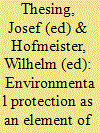

|
|
|
|
|
| Publication |
Germany, KAS, 1996.
|
| Description |
206p.pbk
|
| Standard Number |
3931575209
|
|
|
|
|
|
|
|
|
|
|
|
Copies: C:1/I:0,R:0,Q:0
Circulation
| Accession# | Call# | Current Location | Status | Policy | Location |
| 057226 | 363.7/THE 057226 | Main | On Shelf | General | |
|
|
|
|
| 2 |
ID:
027866
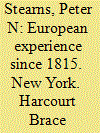

|
|
|
|
|
| Publication |
New York, Harcourt Brace jovanovich inc., 1972.
|
| Description |
vii, 476p.Pbk
|
| Standard Number |
0155247654
|
|
|
|
|
|
|
|
|
|
|
|
Copies: C:1/I:0,R:0,Q:0
Circulation
| Accession# | Call# | Current Location | Status | Policy | Location |
| 009499 | 940.28/STE 009499 | Main | On Shelf | General | |
|
|
|
|
| 3 |
ID:
134335
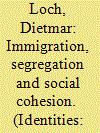

|
|
|
|
|
| Summary/Abstract |
In this article, we analyse immigrant integration against the background of German society’s social cohesion. First, we examine the integration process and policies with regard to the integration of first-generation labour migrants into the German ‘national society’ since the 1960s. Even though these ‘guest workers’ were confronted to ethnic and political exclusion owing to the so-called German integration model, they experienced socio-economic integration and, at the local level, some form of political participation. Secondly, we analyse the policies and the integration process of immigrant youth, specifically those of Turkish descent, into contemporary German society, the social cohesion of which is impeded by social exclusion and urban segregation. Our hypothesis is that – in spite of a long-standing refusal to recognise itself as an immigration country – Germany has to some extent incorporated its migrants and achieved an integration consensus, while paradoxically, national integration models in several other Western European countries are currently going through a deep crisis.
|
|
|
|
|
|
|
|
|
|
|
|
|
|
|
|
| 4 |
ID:
115224
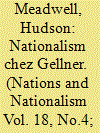

|
|
|
|
|
| Publication |
2012.
|
| Summary/Abstract |
The central distinguishing feature of Ernest Gellner's most important treatment of nationalism is the proposition that nationalism is necessary for industrial society. Relatively little attention has been paid to the philosophical dimension of this proposition. The question of necessity in social explanation, however, is a complicated philosophical problem and must be dealt with directly if this proposition is to be endorsed. I argue that Gellner's argument is philosophically flawed. The 'ordinary prose' of Nations and Nationalism fails to deliver what Gellner claims to have delivered: the demonstration of a necessary connection between nationalism and industrial society. This result is of particular relevance given Gellner's philosophical interests.
|
|
|
|
|
|
|
|
|
|
|
|
|
|
|
|
| 5 |
ID:
047328
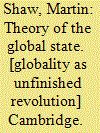

|
|
|
|
|
| Publication |
Cambridge, Cambridge University Press, 2000.
|
| Description |
295p.
|
| Standard Number |
0521597307
|
|
|
|
|
|
|
|
|
|
|
|
Copies: C:1/I:0,R:0,Q:0
Circulation
| Accession# | Call# | Current Location | Status | Policy | Location |
| 044847 | 327/SHA 044847 | Main | On Shelf | General | |
|
|
|
|
| 6 |
ID:
086635
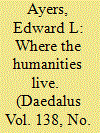

|
|
|
|
|
| Publication |
2009.
|
| Summary/Abstract |
In 1964, the historian J.H. Plumb announced a crisis in the humanities: " Alas, the rising tide of scientific and industrial societies,combined with the battering of two World Wars, has shattered the confidence of humanists in their capcity to lead or to instruct.
|
|
|
|
|
|
|
|
|
|
|
|
|
|
|
|